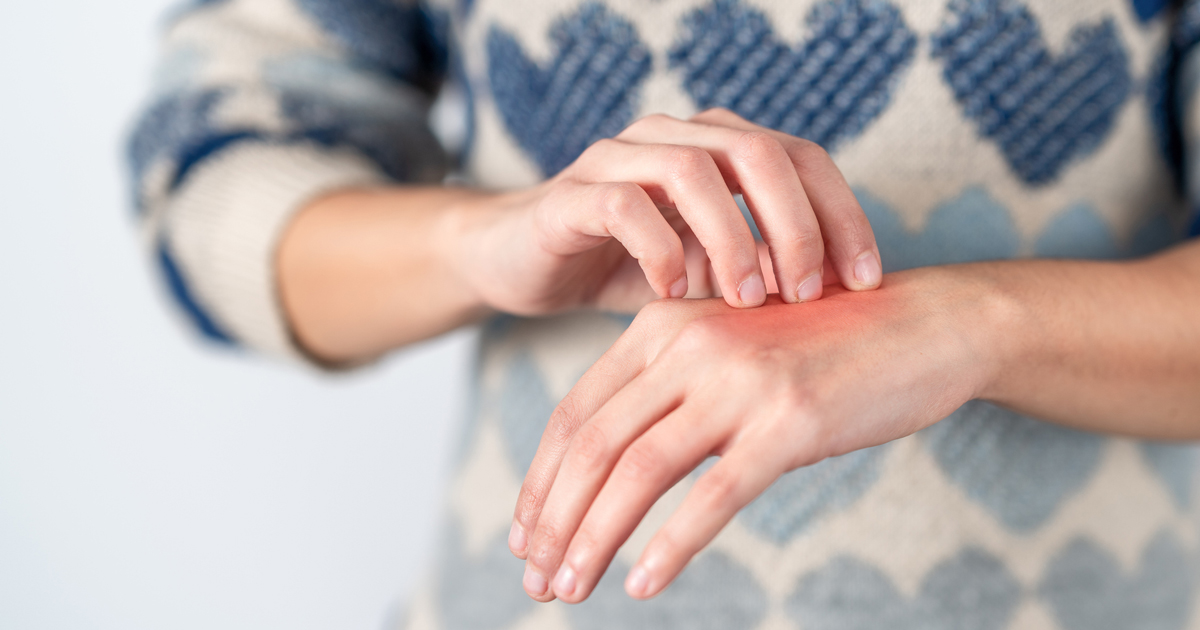How do I know if I have psoriasis or eczema?

To an untrained eye, self-diagnosis of eczema and psoriasis is quite difficult. Both are inflammatory skin diseases with common symptoms. Eczema tends to be seen more in the younger population than psoriasis. Both can have a genetic predisposition, but more important factors for diagnosis include symptoms, what parts of the body are affected, and the patient's symptoms.
"Eczema is described as the itch that rashes," explains Kristie Hayes, MD, Nebraska Medicine dermatologist. "Itch is a more common presentation and chronic side effect of eczema. Psoriasis is much less itchy and where it appears on the body is different than eczema. Some patients may experience features of both. Early diagnosis is helpful for both psoriasis and eczema as both conditions can progress. Early steps and treatments mirror each other, depending on how much of the skin is involved and the patient's age. Early control matters because it reduces the instances of secondary skin infection."
Eczema can have an early onset and tends to present anywhere from infancy to 2 years of age, and in childhood from ages 2 to 10. Psoriasis tends to present later under the age of 21 and is less common in infants and children.
Does skin tone make a difference in diagnosis?
"While skin color is on the list, it is less of a diagnostic factor than other more important questions we ask. Dermatologists are trained to see skin disease in terms of what they see, how it feels and presents on the skin. What part of the body is affected (distribution)? How are the skin lesions grouped together? What are their shapes? Dermatologists expect to see a whole range of colors when looking at affected areas," according to Dr. Hayes. "We also pay attention to the overall condition of the skin, any previous treatments, signs of other infection, and any symptoms the patient is experiencing that may exist or be lacking. All of these factors are taken into consideration when making a diagnosis."
Early detection of psoriasis and eczema is key
Depending on a wide variety of factors, treatments can be very similar for both conditions. Seeking proper treatment and taking good care of your skin will help limit symptoms. Hydration is extremely important, especially early on for patients with a family history. Increasing hydration will also help to control the itch, particularly with eczema. Various kinds of topical therapies can be highly successful as well.
"Be sure to establish a relationship with a primary care provider. See them regularly so they can observe skin changes and answer questions. Telehealth has been a huge help in terms of increased access to dermatologists and our ability to help more patients. Patients can send in a picture of a rash and get advice within 24 hours," says Dr. Hayes. "I recommend patients see a dermatologist yearly to establish a good baseline. There are areas of your skin you cannot easily see, so it's a good idea to have trained eyes on it with regular full-body skin exams. Include the skin in your regular health care maintenance, just like you would get your blood pressure checked or routine teeth cleaning. Early detection is key."
You deserve to be comfortable in your skin
If you are hesitant to see a doctor about your skin, Dr. Hayes has some advice. "While there most certainly can be social and psychological stigmas, it's important for patients to know there is hope for whatever skin condition they may have. We will always do the best we can to improve the condition. Come and let us take a look. It sounds simple, but we are trained to detect and diagnose skin disease. There's a much greater range of treatment than there used to be, so even if you've been treated before, never give up hope. Come in so we can help you find relief. We're here to help."







